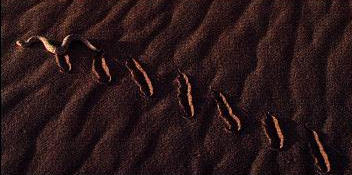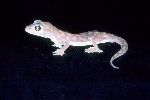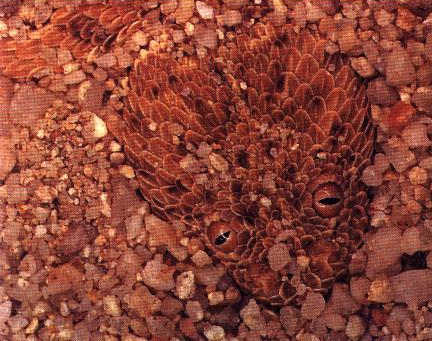![]()
 Life in the Desert!
Life in the Desert!
Imagine, you live on a sea of dunes. As far as the eye can see there is sand,
sand, nothing but sand. Dunes,
300 metres high, stretch to the sea. During the day,
the African sun bakes the sand to a life threatening 60C. The night freezes
it to
well under 0C! To make matters worse, it rains only once every five years
here.
Imagine you are a small animal living here.
How do you survive?
What do you do?
Well, if your name is Bitis peringueyi, alias Peringuey's adder, you are
perfectly at home here.
During the daytime you burrow into the cooler sand.
Only your eyes,situated conveniently on top of your head secretly survey
the hot world above. Your eyes and skin closely resemble the
quartz sand grains and so provide an excellent camouflage.
Every few days the cold ocean and the desert combine to supply a drink of
water:
Fog rolls inland, sometimes as much as 50 km.
All you have to do to drink is
suck droplets of condensed moisture from your body.
An artist in this technique is the shiny black longlegged Onimachris unguicularis.
On mornings when fog has penetrated the dune area and
enveloped the dune slipfaces where he has buried himself for the night,
he surfaces and makes his way to the crest of the dune.
Here, turning towards the wind, he lets the fog condense on his body.
Then he lifts himself up by his back legs into a head-standing position
so that the drops run forwards towards his mouth.
Simple, isn't it?

The colorful translucent web-footed gecko, Palmatogecko rangei
keeps cool by simply staying indoors (under the sand) during the night.
Two sand-diving lizards, the dune-plated lizard, Angolosaurus skoogi,
and the slip-face lizard, Aporosaura anchietae
are champion swimmers in the sand. To escape danger,
they will dive beneath the sand with a rapid wriggling movement.
They keep regular hours and sleep at night.
To keep cool they perform a thermoregulatory footlifting dance,
holding the tail high above the surface of the sand.
So you see, even (or especially?) in such a harsh and unlikely habitat
you will meet the most interesting local inhabitants.
Click here to receive Africa Now in your Email !

(See
last weeks story and others here.)
Copyright(C) 2003 You and Africa. All Rights
Reserved.